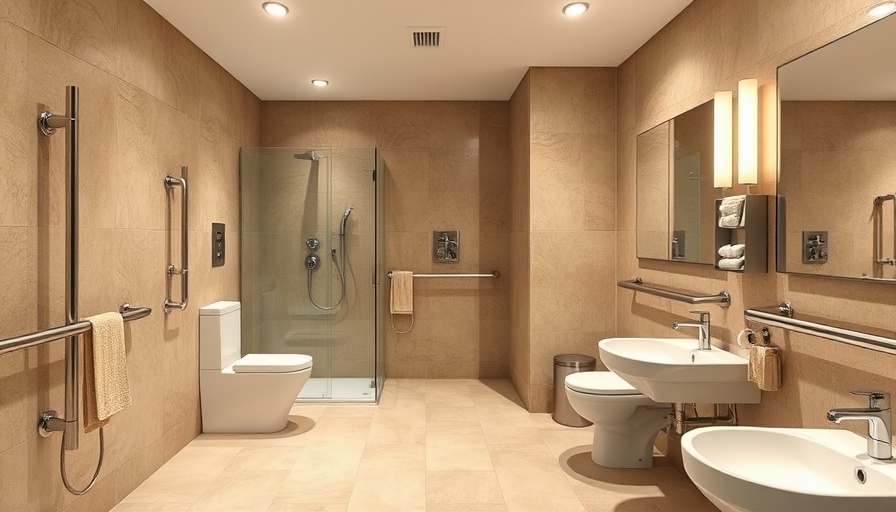
Understanding Accessible Bathrooms: A Essential Guide for NJ Businesses
As the landscape of customer expectations evolves, the importance of accessible bathrooms in New Jersey businesses cannot be overstated. Creating an inclusive environment is not solely a legal necessity; it is a pivotal element of customer service and community engagement. Understanding the specific regulations and best practices surrounding accessible bathrooms is essential for compliance and fostering a welcoming atmosphere.
Why Accessible Bathrooms Matter
Accessible bathrooms serve as a mirror reflecting a business's commitment to inclusivity. New Jersey law dictates that public accommodations must offer bathroom facilities that are accessible to all individuals, irrespective of their physical capabilities. Ensuring everyone may access facilities—from retail shops to eateries—can significantly enhance customer satisfaction. Beyond mere compliance, businesses that prioritize accessibility build a reputation as welcoming and accommodating establishments. This proactive strategy is likely to encourage people with disabilities, their friends, and families to frequent these businesses, ultimately expanding the business's reach within the community.
The Legal Framework Surrounding Accessibility
Before delving deeper, it’s crucial for business owners to comprehend the legal necessities tied to accessible bathrooms. The Amercans with Disabilities Act (ADA) provides extensive guidelines related to bathroom accessibility in public areas. This legislation requires that public facilities include accessible restrooms tailored to meet specific standards.
Moreover, New Jersey’s Uniform Construction Code (UCC) introduces additional criteria, reinforcing the importance of compliance. Businesses that fail to adhere to these regulations may incur significant penalties, face lawsuits, and even tarnish their reputation. Gaining familiarity with these requirements is not merely prudent; it is essential for sustained operational integrity.
Best Practices for Accessible Bathroom Design
When it comes to compliance, businesses must meticulously design and implement accessible bathroom facilities. Key considerations include:
- Entrances: Must be obstruction-free and accommodating for wheelchair access.
- Doorways: Should measure at least 32 inches wide to allow for mobility devices.
- Layout: Within the restroom, maintain a minimum of 60 inches between parallel sides to ensure easy navigation.
- Grab Bars: Essential around toilets to enhance stability and safety.
Although these considerations may appear minor, they significantly contribute to the creation of an inviting environment for all customers.
Maintenance: A Commitment to Accessibility
Having accessible bathrooms isn’t enough; businesses must ensure these facilities are well-maintained. Regular inspections should be conducted to verify that the facilities remain clean, functional, and compliant with regulations. Any issues must be promptly addressed to sustain customer satisfaction and meet legal standards.
Signage: Effective signage is paramount. Businesses should employ clear and visible signs indicating accessible facilities. This not only aids those seeking assistance but also reinforces the business's commitment to inclusivity.
Emphasizing the Benefits of Compliance
By prioritizing accessible bathrooms, businesses not only adhere to legal standards but also unlock significant advantages. Accessible facilities can lead to increased patronage from individuals with disabilities and their support networks. Moreover, showcasing commitment to inclusivity can enhance a business's brand image and foster customer loyalty.
An inclusive environment can even boost employee morale, leading to improved productivity and job satisfaction.
The Bigger Picture: Accessibility in New Jersey
This focus on accessible bathrooms is a microcosm of a larger movement towards inclusivity in New Jersey. As societal awareness grows, businesses that take proactive measures demonstrate their commitment to creating an accommodating community. Understanding the legal parameters and practical implications of accessible bathrooms places businesses on the front lines of this movement.
In summary, embracing the importance of accessible bathrooms is crucial for business owners looking to foster an inclusive environment. It’s not only a legal obligation but also a beneficial factor in customer retention and community engagement. For NJ businesses, taking action on this front means building a diverse and loyal customer base, promoting goodwill within the community, and ensuring compliance with necessary regulations.
If your business is seeking to improve its accessibility standards, now is the time to take action. By investing in accessible bathroom facilities, you can enhance customer satisfaction and strengthen your business's reputation as a leader in inclusivity.
 Add Row
Add Row  Add
Add 




 Add Row
Add Row  Add
Add 

Write A Comment